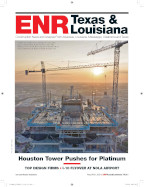
Faced with another year of flat global growth in 2015, executives in the construction-equipment business can barely hide their frustration.
"The U.S. market should be in a strong recovery," says Ron DeFeo, chairman of Terex Corp. "But because there is lack of confidence in the vision on infrastructure, we are still somewhat slow to recover." He did not see much business coming from reconstruction in war- ravaged Middle East countries, either.
"A lot of politicians are talking big," Paul Browne, Volvo spokesman, said last month during a rainy Bauma China equipment exhibition in Shanghai. "The Silk Road plan is one example. That is a promise, but there is nothing so far," he added, speaking of Beijing's $40-billion pan-Asian infrastructure fund, announced a few weeks prior to the show.
Analysts at the exhibition, which drew 191,000 attendees on Nov. 25-28, expect modest sales growth in the U.S. and even less in Europe next year. China and the rest of the world are expected to rise by a half percent, if at all. Exports tell a darker story: U.S. construction-machinery exports dropped 17.3% during the first half of 2014 compared with midyear 2013, according to the Milwaukee-based Association of Equipment Manufacturers.
Equipment makers said they were worried about dipping oil and raw- materials prices squelching demand. With little cash to go around, estimators are reviewing proposals for used or rented machinery. "Volumes are dropping, and contractors are not buying many machines," Browne said.
The growing rental and leasing business in Asia, where contractors traditionally prefer to own machines, is one sign of cash problems. "If the government freezes availability of funds on projects, that has an immediate effect on machine sales," said Malcolm Early, vice president of marketing at Canada-based Skyjack. "That is one reason why rentals grow."
However, some executives see the trend as a positive sign. "The rise in rentals is boosting our equipment production business in China," said Ken Lousberg, president of Terex China. "About 70% of what we produce in China is being purchased by rental companies, compared to almost nothing seven years back."
Meanwhile, manufacturing has become more global, said Abdulla Tunjar, deputy secretary general of the Construction Machinery Manufacturers and Distributors Association of Turkey. Companies from the U.S., Germany and China are establishing new plants in Turkey because it can provide easy connectivity to Europe and Russia while offering reasonable land and wage prices.
After enduring more than three years of recession, Chinese equipment makers are counting on construction projects at home and abroad, including the redevelopment of thousands of shanty towns and new water-works projects that the government announced in recent weeks. Exports also remain a continued focus.
"We are expecting strong export growth in the United States, Germany, Turkey and India," said Liu Jian Sen, general manager in charge of exports for XCMG, which now has access to strong production bases in these countries after its 2012 acquisition of Germany-based Schwing.
Chinese manufacturers said they are hopeful that some $80 billion in global construction projects—signed during President Xi Jinping's visits, since January, to several countries in Asia and Latin America—will be built by Chinese firms, although, when working overseas, Chinese contractors occasionally use foreign equipment brands because their home manufacturers provide little backup support, analysts said.
Another widespread challenge facing the Chinese manufacturing industry is the breaching of contracts by clients, effectively killing deals that have been signed.
"It is a problem," said China Construction Machinery Association head Su ZiMeng. "We are not saying the problem is very serious. It can happen in a low-selling period, when competition is tough, but we want to curb malpractices."








Post a comment to this article
Report Abusive Comment